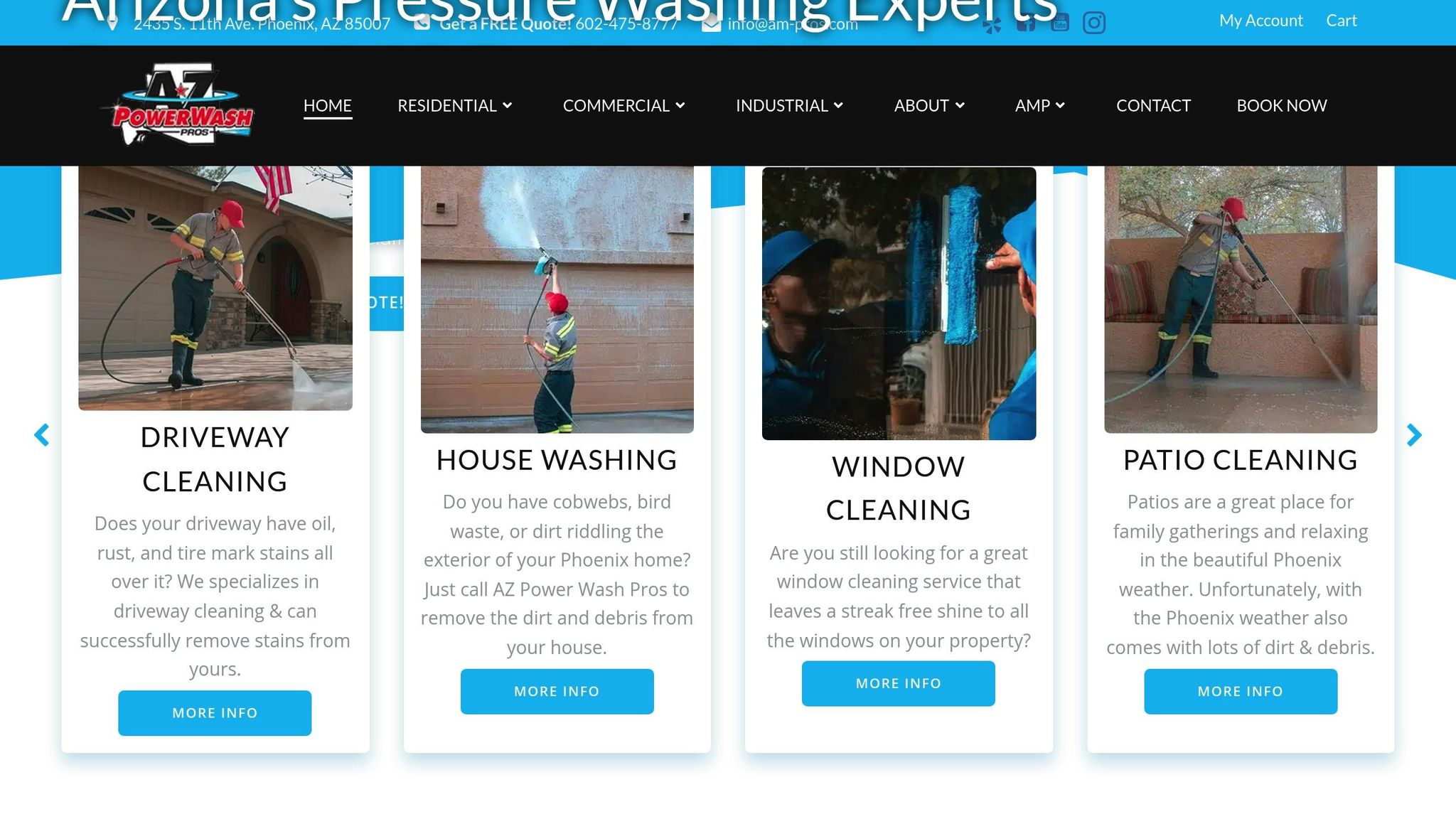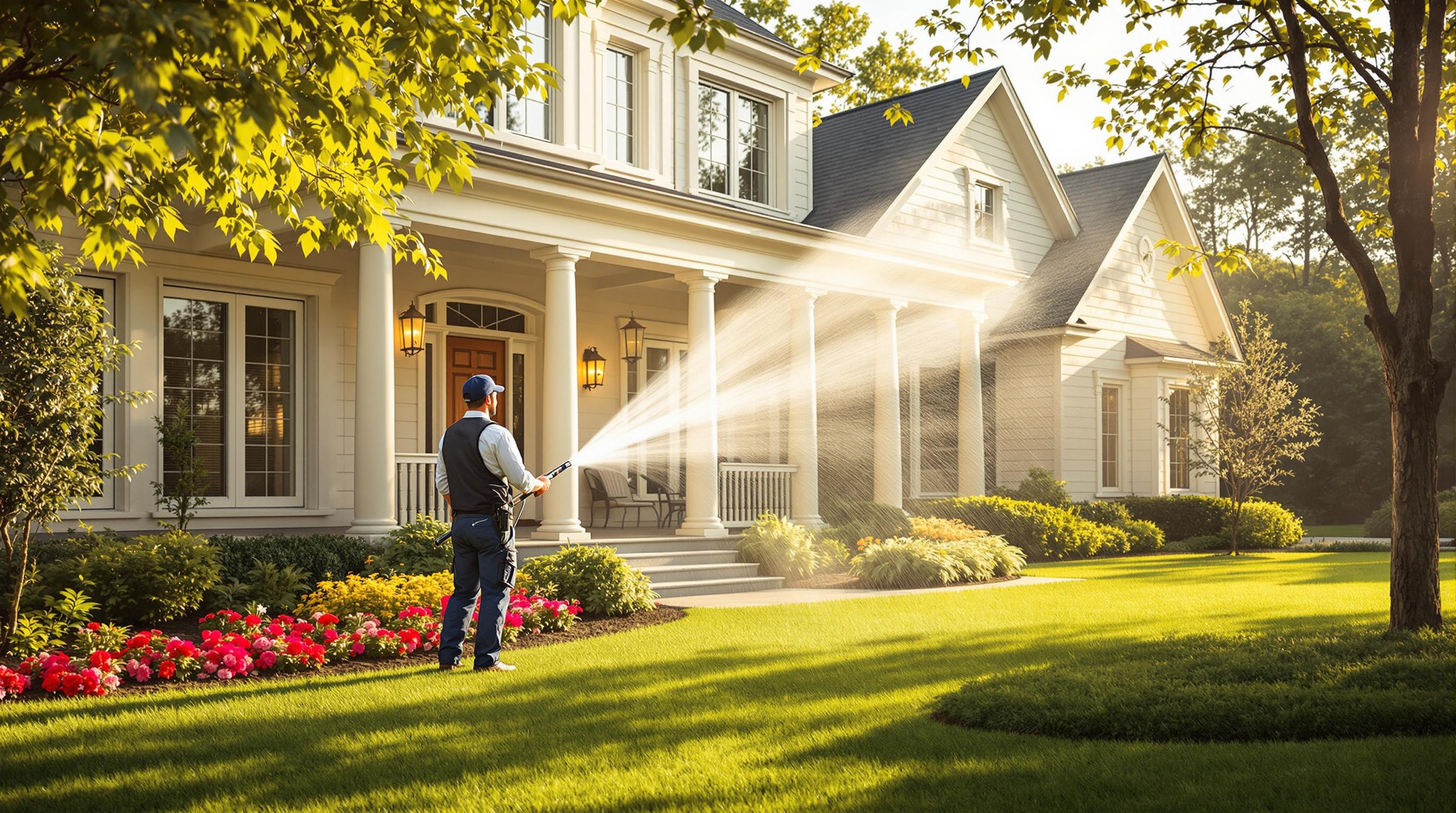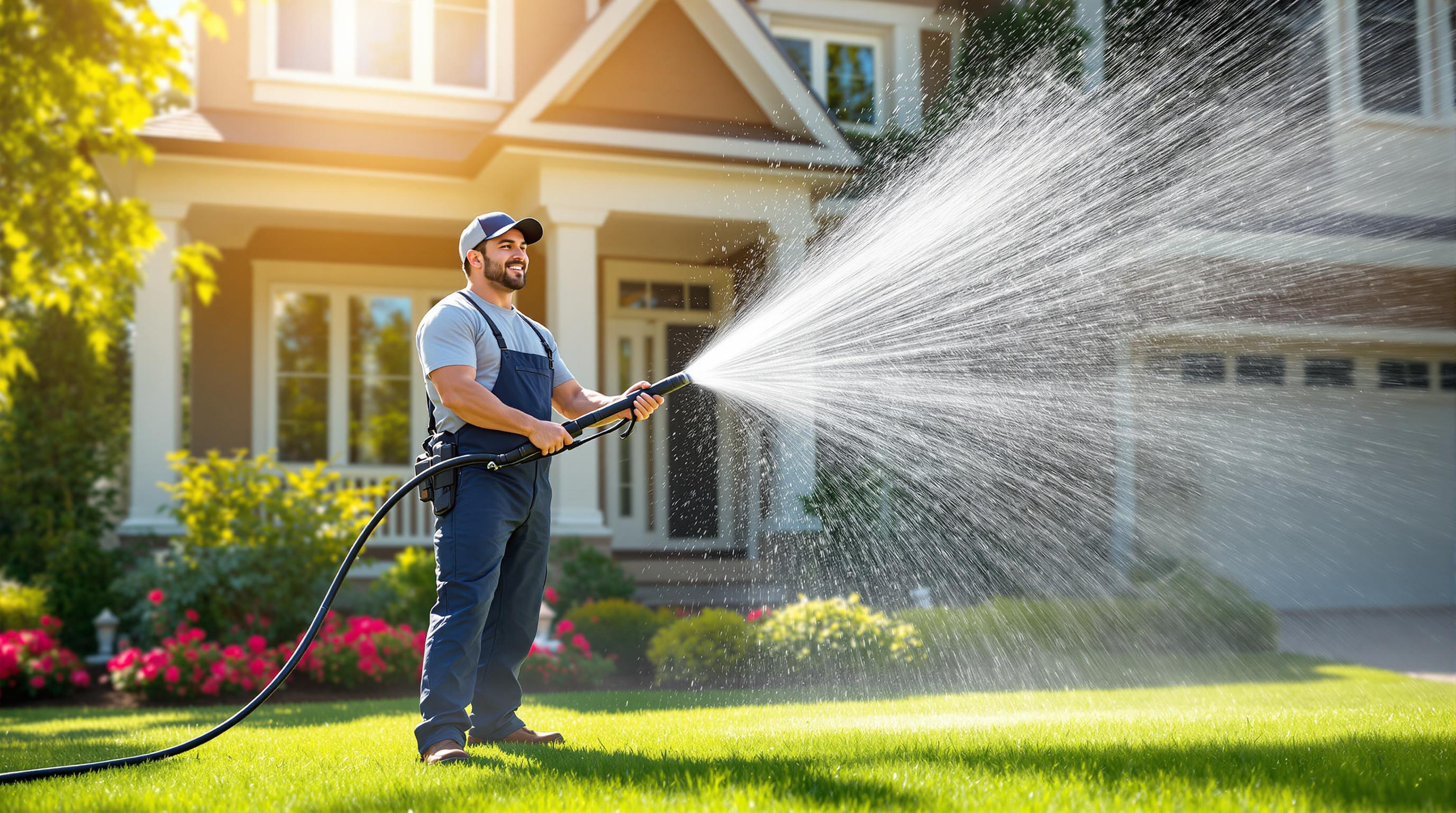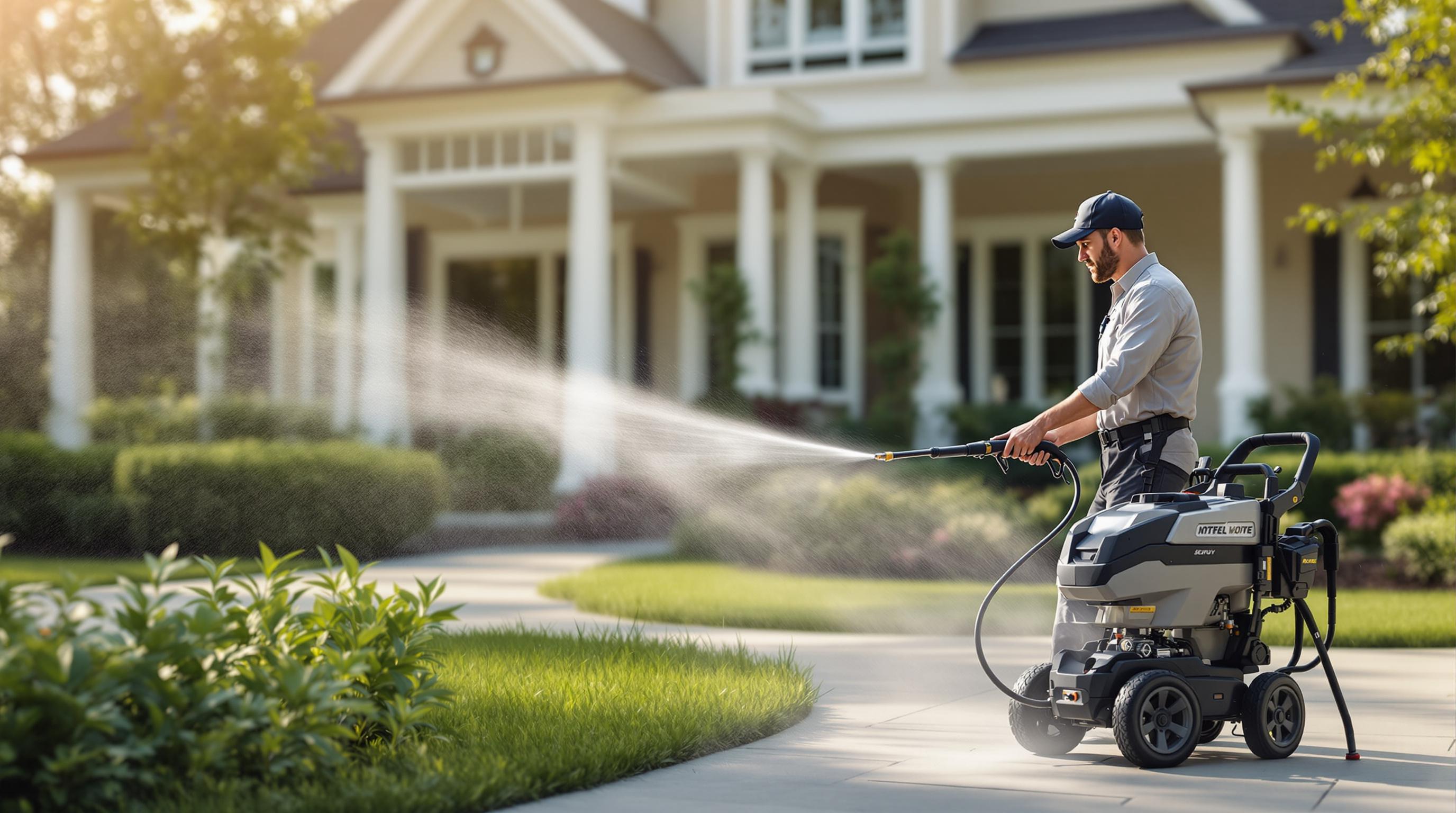Eco-friendly pressure washing is all about keeping your property clean while protecting the planet. Here’s what you need to know upfront:
- Save Water and Money: Use high-efficiency nozzles and adjust pressure settings to reduce water use and lower your water bill.
- Avoid Harmful Chemicals: Choose non-toxic, biodegradable cleaners that are safe for plants and waterways.
- Inspect Before Washing: Identify storm drains, delicate vegetation, and surface issues to prevent damage and pollution.
- Manage Runoff: Use barriers, water reclamation mats, and filters to stop polluted water from entering storm drains.
AZ POWER WASH PROS INTRODUCES ECO-FRIENDLY ...

Property Inspection Before Washing
A thorough inspection helps pinpoint potential risks to the surrounding environment and guides the creation of an environmentally conscious cleaning plan.
Pre-Wash Checklist
Before starting pressure washing, focus on these important areas:
- Drainage Assessment: Locate storm drains, catch basins, and water flow paths. Mark these spots to prevent cleaning solutions from entering waterways.
- Surface Evaluation: Look for:
- Loose or damaged materials
- Cracks or gaps in surfaces
- Areas needing special treatment
- Evidence of past chemical treatments
- Vegetation Survey: Note garden beds, sensitive plants, and nearby root systems.
| Inspection Point | Action Required |
|---|---|
| Storm Drains | Use barriers and filtration to prevent water pollution |
| Plant Areas | Apply plant-safe cleaners and maintain a 3-ft buffer |
| Soil Zones | Use absorbent mats and biodegradable cleaning products |
These findings help identify areas that need extra care.
High-Risk Areas to Watch
Some property features demand special attention when using eco-conscious pressure washing methods:
Permeable Surfaces: These surfaces need careful handling to avoid contaminating groundwater:
- Gravel driveways
- Brick pavers
- Natural stone patios
Protected Zones: Use barriers to shield garden beds (keep a 3-ft buffer), water features, and delicate architectural details.
At Pressure Washing Cary NC, we perform detailed property inspections to ensure safe and environmentally friendly cleaning while preserving your property’s unique features. Our process tailors the cleaning approach to suit each situation effectively.
Safe Cleaning Products
When selecting cleaning products for your property, it's important to choose options that clean effectively while also being gentle on the environment. Using the right products not only protects your property but also helps preserve local ecosystems. Let’s dive into some non-toxic choices that align with these goals.
Non-Toxic Cleaners
Choosing environmentally friendly cleaning products is a key step in promoting safety for both your property and the planet. Look for products carrying the EPA Safer Choice Label, as these meet stringent safety and environmental standards.
Here are some ingredients you should look for:
- Biodegradable surfactants and plant-based enzymes
- Natural citrus-based degreasers
- Oxygen-based brighteners
And here are some ingredients to avoid:
- Phosphates
- Chlorine bleach
- Petroleum-based solvents
- Nonylphenol ethoxylates (NPEs)
At Pressure Washing Cary NC, we use eco-friendly cleaning solutions that naturally break down over time, ensuring they leave minimal impact on the environment.
Product Comparison Guide
Beyond selecting non-toxic ingredients, it’s helpful to compare formulations to find products that balance effectiveness with environmental safety.
Benefits of eco-friendly cleaners include:
- Quick biodegradation
- Near-neutral pH levels to prevent surface damage
- Effective cleaning with reduced water usage
- Safe for plants and surrounding vegetation
How to apply these products:
- Test on a small, inconspicuous area first
- Follow the recommended dilution ratios
- Apply from the bottom up
- Allow enough dwell time for the cleaner to work
- Rinse thoroughly to remove all residue
sbb-itb-8e2a680
Water Management
After selecting the right equipment, managing water use effectively is critical for conserving resources and protecting the environment.
Ways to Save Water
Using tools and techniques that limit water waste can make a big difference. Many modern pressure washers come with adjustable settings to help control water use while still delivering great results.
Here are some practical ways to save water:
- Use high-efficiency nozzles for better spray patterns.
- Adjust pressure settings based on the surface being cleaned.
- Pre-soak heavily soiled areas to minimize water use during cleaning.
- Focus on cleaning one area at a time to avoid wasting water.
At Pressure Washing Cary NC, we use systems with variable pressure controls to fine-tune water flow depending on the surface. Managing wastewater is just as important to keep local waterways clean.
Managing Runoff
Controlling runoff is key to preventing polluted water from entering storm drains or seeping into groundwater.
Some effective runoff management steps include:
- Setting up containment berms around the cleaning area.
- Using water reclamation mats to collect and filter runoff.
- Installing filters in catch basins.
- Directing wastewater to designated collection points.
Equipment and Safety
Choosing the Right Equipment
When selecting pressure washing tools, it's important to consider options that are better for the environment. Using professional-grade pressure washers with adjustable settings can help you control both water usage and cleaning power more effectively.
Here are some features to prioritize:
- Variable Pressure Control: Lets you adjust the pressure to match the surface you're cleaning.
- Water-Efficient Nozzles: Multi-pattern spray tips help distribute water more efficiently, reducing waste.
At Pressure Washing Cary NC, we use top-tier equipment designed to conserve water while delivering excellent cleaning results. Once you've chosen the right tools, following safe operating practices ensures an effective and eco-conscious cleaning process.
Safe Operating Guidelines
Adhering to proper safety measures not only protects your property but also reduces environmental risks. Below are key steps to follow for safe and eco-friendly pressure washing:
-
Pre-Operation Safety Check
Make sure all equipment is in good condition. Inspect hose connections, nozzle attachments, filters, and pressure gauges to confirm they are secure and functioning properly. -
Surface Protection Measures
Shield plants with waterproof tarps, seal off electrical outlets, block areas where drainage could cause issues, and use drop cloths to safeguard surrounding surfaces. -
Environmental Safeguards
Set up barriers to manage runoff, choose biodegradable cleaning solutions, monitor water usage, and keep cleaning products away from vegetation.
Hiring professionals who are experienced and insured ensures the job is done safely and efficiently. Proper operation makes all the difference in achieving great results while keeping your property and the environment safe.
Conclusion
Key Points Review
Eco-friendly pressure washing combines effective cleaning with care for the environment. Here's what matters most:
- Property Assessment: Evaluate the area to spot sensitive features and potential risks before starting.
- Environmental Safety: Use eco-conscious cleaning solutions and manage runoff responsibly.
- Right Equipment: Opt for professional-grade tools designed to save water.
- Safe Practices: Stick to safety guidelines to protect both the property and the surrounding environment.
Use this knowledge to make informed decisions and take action.
Next Steps
Ready to adopt eco-friendly pressure washing? Follow these steps to ensure your cleaning efforts are both effective and responsible:
-
Evaluate Your Property
- Identify the types of surfaces, levels of buildup, and any nearby delicate areas.
- Make note of spots that need extra care.
-
Hire Professionals
- Reach out to experts like Pressure Washing Cary NC for eco-conscious cleaning services.
- Verify they use the right tools and environmentally friendly methods.
-
Stick to a Maintenance Schedule
- Plan regular cleanings to avoid excessive buildup.
- Keep a log of cleaning dates and techniques for future reference.
FAQs
What steps can I take to make sure pressure washing is environmentally friendly and safe for local waterways?
To ensure eco-friendly pressure washing, it's important to use methods that minimize harm to the environment. Start by avoiding harsh chemicals and opting for biodegradable cleaning solutions. Properly manage wastewater to prevent it from entering storm drains or nearby waterways.
For a hassle-free and environmentally safe approach, consider hiring professionals like Pressure Washing Cary NC. Their experienced team uses best practices to deliver high-quality results while prioritizing environmental safety. They handle everything from home exteriors to driveways and roofs with care and expertise.
What should I look for in eco-friendly pressure washing equipment?
When choosing eco-friendly pressure washing equipment, focus on features that minimize environmental impact while maintaining efficiency. Look for machines with adjustable pressure settings to reduce water usage and prevent surface damage. Opt for equipment that supports biodegradable or eco-friendly detergents, ensuring safe runoff into the environment.
Additionally, consider pressure washers with water recycling systems or those designed for efficient water use, as these can significantly lower water consumption. By selecting equipment with these features, you can achieve effective cleaning results while prioritizing sustainability.
How can I manage water runoff responsibly during pressure washing?
Managing water runoff during pressure washing is essential to protect the environment and comply with local regulations. Start by inspecting the area to identify storm drains or waterways nearby and take steps to prevent runoff from reaching them. You can use barriers like sandbags or silt socks to redirect or contain the water.
Additionally, minimize the use of harsh chemicals and opt for eco-friendly cleaning solutions when possible. Collect and properly dispose of wastewater if required by local guidelines. By taking these steps, you can ensure your pressure washing practices are both effective and environmentally responsible.


